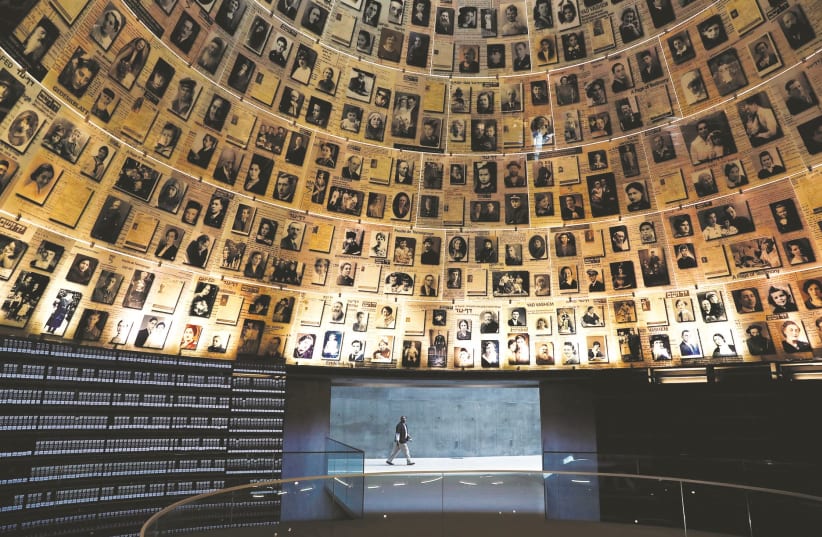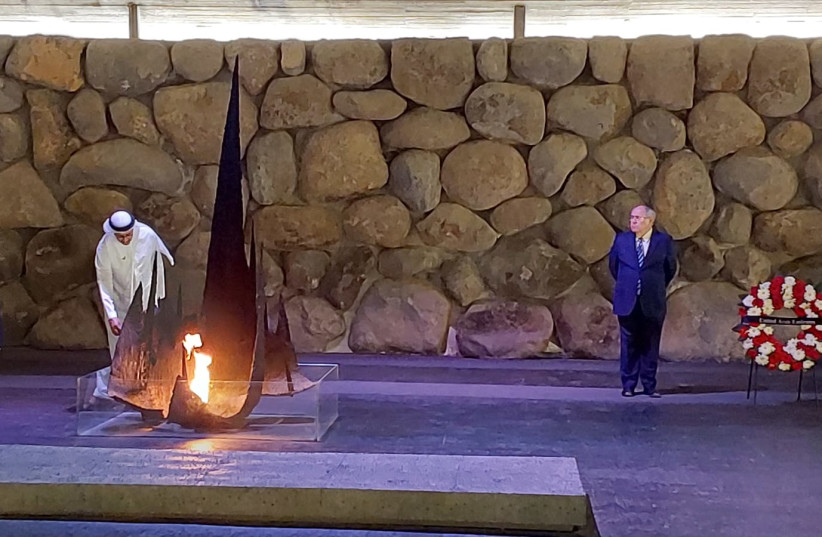A new report on antisemitism worldwide highlighted a growing recognition of the Holocaust in the Arab world, alongside renewed cultivation of Jewish heritage.
According to the report, an encouraging trend was observed this year in several Arab countries, with rising recognition of the history of antisemitism and the crimes of the Nazis. For example, in January 2022, Egypt took part in a session of the UN General Assembly that adopted a resolution condemning Holocaust denial.
The Egyptian Ambassador to the UN conveyed the Arab consensus on the resolution.
“This positive trend reflects a significant turnaround in Arab discourse on Jewish history,” the report cited. “This was displayed in quite a few new initiatives, some in the literary sphere, promoting the preservation of Jewish heritage in several Arab countries, including Saudi Arabia, Egypt and Morocco.” These projects are described extensively in the report.
Initiative to change Arab discourse on Jewish history
On the eve of International Holocaust Remembrance Day 2023, The Center for the Study of Contemporary European Jewry at Tel Aviv University published its annual report entitled 'For a Righteous Cause', focusing on initiatives of governments and citizens around the world to preserve Jewish heritage, teach about the Holocaust, and combat antisemitism and racism in general. The report aims to express appreciation for inspiring initiatives, encourage other similar activities, and propose ways for further improvement.
The report also combined policy recommendations, one of which is that “the Egyptian authorities should be encouraged by Western governments and international organizations to continue and promote policies that create a climate of religious pluralism and tolerance towards Jews and Judaism and religious minorities at large.”
In addition, “Israel should warmly welcome displays of tolerance toward Jews and Judaism and render support, including financial, to initiatives that aim to revive Jewish heritage in Egypt and other Arab countries. Israeli Jews who migrated from Arab states can play a role in bridging the gaps of time and place through tourism, education, and culture exchanges.” The report also suggested that “Israel and Egypt should establish joint governmental and civil initiatives with the participation of descendants of the Egyptian Jewish community. Such activities can enable neighbors to express their appreciation for each other, revive their forgotten shared history, and build their common future.”
The findings presented in the report indicate that recognizing the Holocaust and teaching lessons derived from it have recently expanded, even in countries where Holocaust education was uncommon, including in Africa and the Arab World. Alongside this positive trend, many educational, social and legal initiatives for combating Holocaust denial and antisemitism have been advanced in Western Europe, America, and Australia, indicating broad recognition of the problem and its severity.
Recognition of antisemitism on the rise
The report’s findings indicate that recognition and teaching of the Holocaust have spread - even to countries where it was previously uncommon.
The report includes an extensive discussion about Cyprus, presenting it as a model to be emulated: “even though no antisemitic incidents have been recorded in the country in recent years, its government has emphasized teaching the history of the Holocaust and the lessons derived from it in the education system, in law enforcement organizations, and in sports clubs,” the report suggested.
The report analyzed the emerging interest in Jewish history and the Holocaust in several African countries, which see a resemblance between the tragedies experienced by the Jewish people and crimes against humanity perpetrated on the African continent. “This sentiment is expressed, for example, in the Genocide Memorial National Museum in Rwanda, which commemorates the genocide of the country's Tutsi minority that occurred four decades after the Holocaust while the world looked on in silence,” the report said.
Significant positive developments were also observed in formerly Communist countries. In December 2021, the Elie Wiesel National Institute for the Study of the Holocaust in Romania launched the project “Stories from the Holocaust - Local Histories.” This initiative aimed to enhance Romanians' knowledge about their communities' history from the perspective of Jews and Roma persecuted during the Holocaust. In 2022 the project included street exhibitions featuring the life stories of Jews and Roma and their tribulations during this dark period.
In November 2022, the Bulgarian Foreign Ministry organized an international conference on combating antisemitism and preserving Jewish heritage.
A significant step forward in combating antisemitism was also recorded in Ukraine. In February 2022, just a week before the fascist Russian invasion, the Ukrainian Parliament approved strict sentencing measures for antisemitic hate crimes: five to eight years in prison for antisemitic violence and a substantial fine for anti-Jewish incitement.
The report documents many initiatives introduced over the past year in the Western World for preserving Jewish heritage, teaching about the Holocaust and combating antisemitism. The initiatives indicate a growing awareness of the dangers posed by antisemitic propaganda on the internet, as well as increasing recognition of the importance of educating younger generations about the Holocaust.
Notable initiatives included: The European Commission marked the first anniversary of the “European Union Strategy on Combating Antisemitism and Fostering Jewish Life (2021-2030)”. Actions during the first year included: combating antisemitism on the internet; the signing of the Vienna Declaration by 11 EU member states and several international organizations which committed to developing a common, standard methodology for recording antisemitic incidents; and launching a project to protect Jewish cemeteries in Moldova, Ukraine, Georgia, Poland, Hungary, Slovakia, and the Czech Republic.
Following discussions held in 2022, the European Parliament and European Commission are expected to pass the Digital Services Act, requiring online platforms to remove hate speech, provide information on their use of algorithms, and have clear rules to address complaints related to hate speech.
The report presents a detailed case study on the transformation of the German football club Borussia Dortmund – as a model of commitment to the fight against antisemitism, setting an example for other European sports clubs and organizations. The club, which in the past served as fertile ground for the activities of neo-Nazi pseudo-fans, now takes an active and firm stand against antisemitism. Among other actions, the club conducts educational tours for young fans to concentration camps and works closely with Yad Vashem.
Prof. Uriya Shavit, Head of the Center "Regretfully, it must be admitted that despite global support for the fight against antisemitism, being a Jew has become less safe almost everywhere in the world. But giving up the struggle is not the solution. We must learn systematically, in a comparative manner, what has been done and what can be improved."
Prof. Shavit, head of the Center for the Study of Contemporary European Jewry at Tel Aviv University shared that "while our purpose was to highlight positive initiatives for combating antisemitism all over the world, we also noted at the beginning of the report that his fight must not become the only identity-definer of Jewish intellectuals and organizations, that the Jewish moral compass must not be limited to this issue alone, and that the study of Jewish history should not focus solely on the Holocaust. Israel cannot express reservations about European political parties with roots in fascism and expect to find a different attitude in Europe toward Israeli parties with fascist roots."

